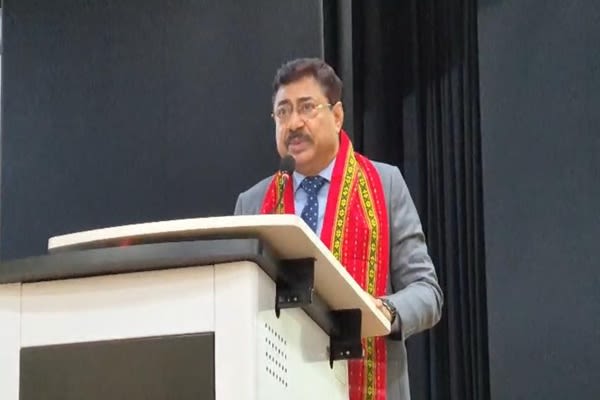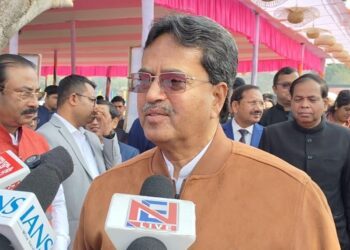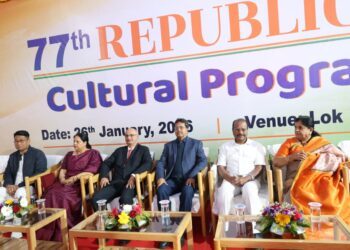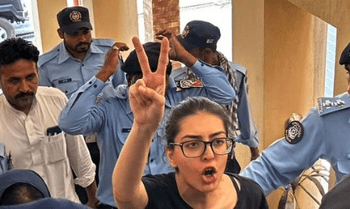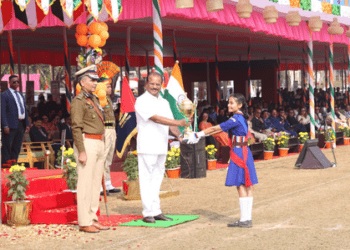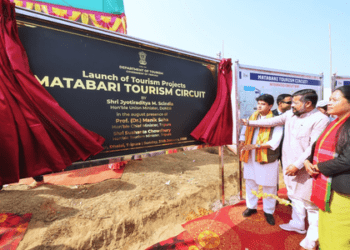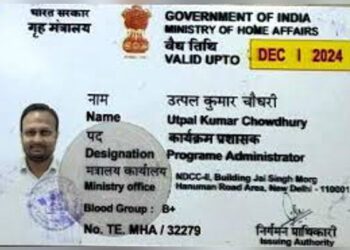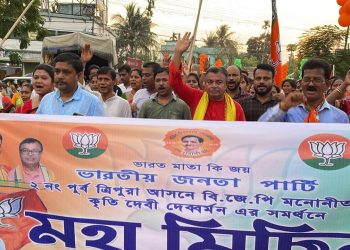In commemoration of Samvidhan Diwas, the Public Relations and Media Committee of National Law University, Tripura organized a National Symposium titled “Press, People and the Constitution: Reimagining Freedom and Accountability” on Wednesday. The symposium brought together students, academicians, journalists, and legal experts to reflect on the evolving role of the press and the citizenry in safeguarding constitutional values in a rapidly changing information landscape.
Chairperson of the Tripura Human Rights Commission, Justice Arindam Lodh, attended the event as Chief Guest and delivered a deeply reflective address. Drawing on personal history, he recalled his father, late Apanshu Mohan Lodh’s pioneering decision to launch an English newspaper in 1959—not for commercial success, but to connect Tripura with the nation’s policymakers. English, he noted, was then the most effective medium to amplify local voices in Delhi and communicate the aspirations and grievances of the people of Tripura.
Justice Lodh emphasized that the core of journalism lies in constitutional morality—a principle not explicitly stated in the Constitution but inherently embedded in the Preamble. Quoting Dr. B. R. Ambedkar, he reminded the audience that “The Constitution is the vehicle of life and must be driven with wisdom and responsibility,” stressing that journalists, citizens, and institutions are all custodians of constitutional ideals. He elaborated on the primacy of “We the People of India,” underscoring that true sovereignty rests with the people. While discussing Article 19(1)(a), he highlighted how judicial interpretation has expanded it to include freedom of the press, affirming the Constitution as a living, dynamic document.
Justice Lodh urged the press to adopt a self-regulated code rooted in truth and integrity, especially in an era of instant communication, social media misinformation, and eroding public trust. “Truth is not a slogan, it is a discipline,” he remarked, calling for renewed commitment to ethical journalism.
Senior journalist Subir Bhaumik offered a candid critique of contemporary media, describing journalism as an “endless negotiation” among freedom, accountability, and regulatory pressures. Reflecting on media trials such as the Sushant Singh Rajput case, he highlighted how sensationalism and corporate influence undermine fairness and editorial independence. Despite these challenges, he observed that India retains significant strengths due to long-standing struggles to protect fundamental freedoms.
Vice-Chancellor Prof. (Dr.) Y. P. Singh emphasized that dissent, dialogue, and a vigilant press are indispensable to constitutional democracy. He reiterated that without robust media accountability, India’s developmental aspirations—including the vision for 2047—cannot be realized.
Also present were several dignitaries, including Prof. Krishnan Mahajan, Senior Advocate of the Supreme Court.
The symposium concluded as a compelling reminder of the shared responsibility of the press, the people, and the Constitution in nurturing India’s democratic fabric.


